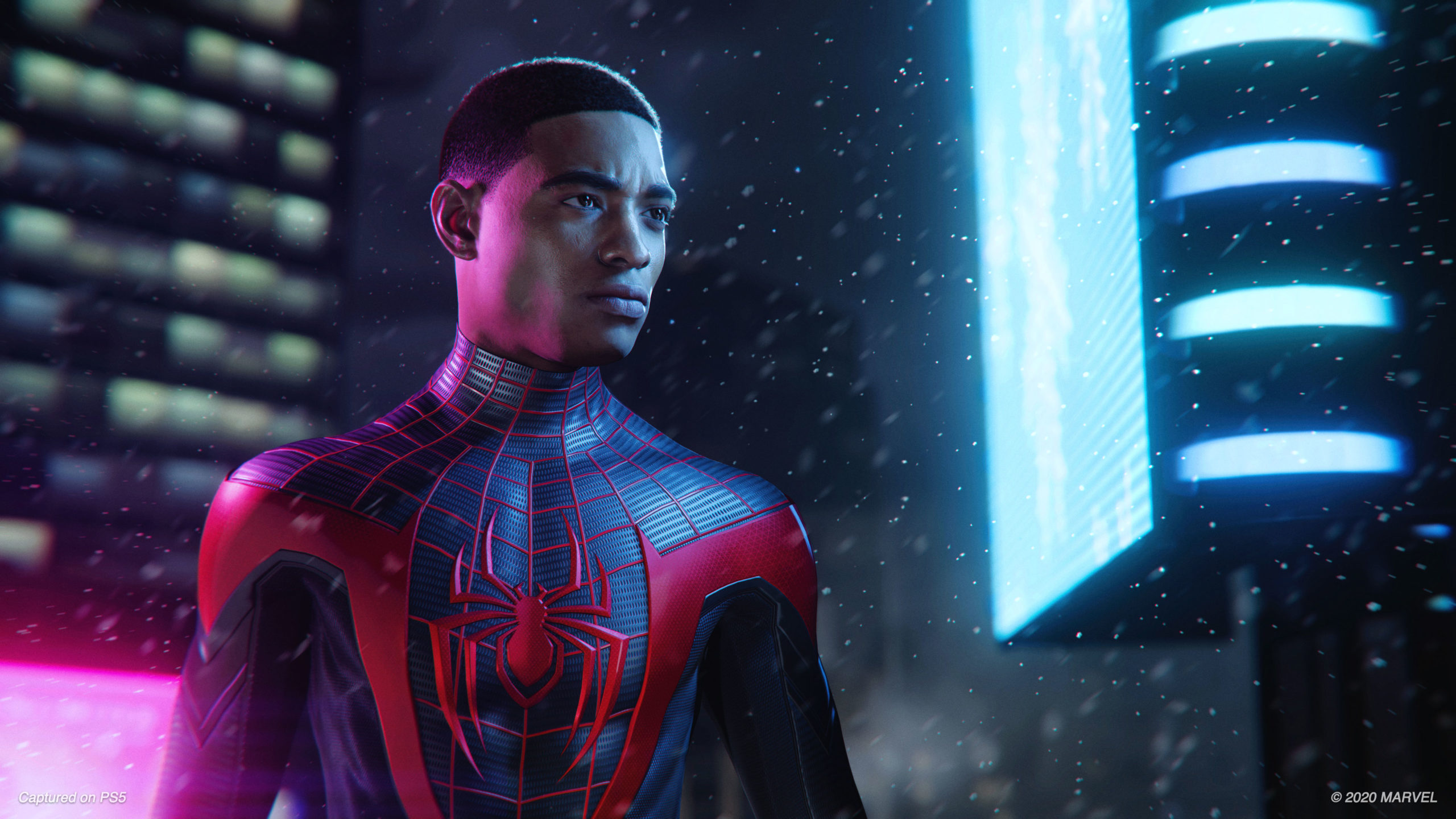‘Spider-Man: Miles Morales’ One-Ups Its Predecessor By Focusing On The Teen Behind The Mask
2:02 PM EST on November 27, 2020
About a third of the way into Marvel's Spider-Man: Miles Morales, the newest superhero game from Insomniac Games, the titular teenage protagonist gets to do what all New Yorkers dreamed of doing on their pre-coronavirus commutes: fix the damn trains. Miles's uncle Aaron, unaware of his nephew's alter ego, asks Spider-Man for help reconnecting train lines in Harlem that have been bungled with by The Underground, an anarchist band of mercenaries. After defeating a handful of low-level henchmen, Miles must use his spectacular spider powers to, in essence, do the MTA's job for it.
While it's not the most memorable or exciting chapter in the game, it's perhaps the one that best exemplifies how much Miles Morales means to his neighborhood, and how important that community is to him. After all, people have to get to work and go about their lives. For this Spider-Man, that's what saving the day looks like.
Launching alongside the PlayStation 5 on Nov. 12, Miles Morales is a spin-off of 2018's Marvel's Spider-Man, which, unsurprisingly, puts the player in control of Miles, while Peter Parker goes off on a work-vacation with his reporter girlfriend, Mary Jane Watson. Miles Morales is a shorter game than its predecessor, less a proper sequel and more like a hefty expansion pack (with an equally hefty $50 price tag), but what it manages to do in its roughly 15-20 hours of narrative gameplay is worth the wallet dip. What Insomniac has crafted feels like more than just another playable avatar, instead giving us one of the more relatable superhero protagonist in recent memory, one that is driven more by his own humanity and love of community than any overriding sense of "great power and great responsibility."
In the game, Miles goes under Peter's wing to learn the sticky ropes of being Spider-Man, but their personal differences only really become obvious once the elder Spidey is out of the picture. Because this is a superhero video game, a massive threat shows up shortly thereafter, but even the nature of the threat highlights the differences between the two games and their leading characters. Whereas Peter battled against gangs and the Sinister Six in order to save the entirety of New York City from a deadly virus (which now feels a bit too topical), Miles's threat is localized: there's a potential nuclear explosion in the cards for Harlem, his adopted home at the beginning of the game.
What follows is a deeply personal story, one that yanks every major figure of Miles's life into focus, from his mother and uncle, to his best friends, to even the local bodega cat (named, hilariously, "Spider-Man"). This is where Insomniac's decision first pays off: the stakes aren't as world-endingly large as in the previous game, but they are perhaps more urgent, as the game takes time out of its already short run-time to show over and over why Miles cares about these people. An early highlight scene has Miles, his mother Rio, his former best friend Phin, and his current best friend Ganke preparing for Christmas dinner. It's a slow scene, filled with details about the lived-in experiences of these characters; the best part is that Miles is tasked with playing the music, and the player gets three real-life song choices to pick from, each with personal significance (I picked Willie Colon's "Esta Navidad," which pays tribute to his mother's Puerto Rican descent).
I won't spoil the big narrative moments of the story as it progresses from there, but fans of the comics will likely pick out one of the game's main antagonists pretty early on, and despite being a less famous character than Spider-Man's Dr. Octopus, there's a real sadness to the choice, one that both rationalizes the villain's motives and Miles's intention to stop them from executing their not-so-evil plan.
This is just another way Miles Morales separates itself from the prior game: it gives its villain as much of a stake as the hero. The evil scheme, as it were, is rooted in personal tragedy and an anti-capitalist sentiment that is, at the very least, understandable, if not almost admirable. But this is still a video game; the main plot line is filled with explosive set-pieces and waves of bad guys that Miles takes down with exhilarating combat moves, but the narrative never loses sight of why the player should care about following the story to its heart-breaking conclusion.
The game's smaller details are perhaps even better at conveying Miles's connection to the plot's setting. Unlike the previous game's disappointing choice of making Spider-Man a damn cop, a friend develops an app for Miles to use in order to help people one-on-one. In gameplay terms, it's just a way to fill the map with side quests, but narratively, it makes sense that the friendly neighborhood Spider-Man would actually field requests from the people, rather than the police. Some of those missions are funny little diversions—a different cat stars in one, where you have to follow his scent as he gets lost in the sewers—while others involve helping fire fighters put out a block-destroying blaze or helping a charity truck get unstuck from ice in order to make food deliveries. Functionally, these play similarly to the last game's side missions, but the presentation is what really matters.
You do still thwart crimes like robberies and kidnappings, but even in those situations, the crimes pop up from citizens reporting them, rather than a convoluted scheme involving hacking into police surveillance towers. It's not a perfect shift, as Miles Morales doesn't grapple head-on with the fact that its protagonist's father was a cop before his death in the previous game. Insomniac instead just mostly shoos the police away from its gameplay and narrative, in hopes that by not really seeing them, the player won't question how the police work or how Miles relates to them in this universe. It's a marginal improvement over the last game, but it's still a dodge. And it doesn't address the fact that superheroes, at their core, are essentially super-powered police, with biases and faults like their human counterparts.
Though the game may fall short on interrogating relationships with the police, there's no denying that Miles Morales comes alive when its titular character is in motion. Insomniac chose to animate Miles like the inexperienced superhero that he is, rather than a seasoned veteran like his mentor. Miles's web-swinging is a bit more out of control than Peter, and his combat is wilder and reliant more on his innate gifts than years of combat training. It's unsteady and loose, giving the sense of play an infusion of uncertainty you'd expect from a teenager suddenly discovering wild super powers. It also just looks better, thanks to his "Venom" powers, which is what the game calls the character's bio-electric capabilities. Swinging around the battlefield, unloading bright yellow electric punches into heavies, even turning invisible when overwhelmed, all of these visual and mechanical choices make the younger Spider-Man play differently enough to warrant the existence of what is essentially just a continuation of the well-received systems in Spider-Man.
Miles Morales also never forgets who Miles Morales (no italics) actually is: an Afro-Latino teenager living in Harlem. The game leans more into the Latino part of that; there are Puerto Rican flags all over the place, including at home, and Miles sometimes dips into Spanish to speak to his mom—and as someone who was born in Venezuela and speaks Spanish with his mom, every "te quiero, mama" hits hard. There are nods to his blackness as well, though the biggest of which is perhaps the first in-game acknowledgement of Black Lives Matter. The main threat of the game targets Harlem because, as one of the more purely evil antagonists says plainly and clearly, no one will care if there's a catastrophe in the neighborhood with a poorer population.
It's a bold choice for a video game, but it's one that is mostly earned with how Insomniac paints Miles's world. It doesn't feel gratuitous because everything he does is in pursuit of protecting his community, and it's relatable because it's how you could imagine anyone with a good heart would react to being gifted the powers of a superhero, especially in the face of a cataclysm they could be able to prevent. That sense of responsibility also isn't unearned, and comes from a place of family; Miles's dad is seen as one of those "good cops" that entertainment properties love to portray, while his mother begins a campaign to represent Harlem on the City Council.
It all ends up feeling more personal for Miles, in a way that is more considered and significant than Peter's quest was in the original. In a way, it's more like 2017's Spider-Man: Homecoming, which saw Tom Holland's Peter dealing with the weight of being Iron Man's protege and discovering his crush's father is a wing suit-wearing techno-villain. That movie didn't have a world-ending (or even city-ending) threat at its core, a choice that made it fresher than every other Marvel Cinematic Universe film this side of the Ant-Man movies. Similarly, Miles has a singular goal—"protect Harlem"—and the lack of distractions, whether for the purpose of fan service or for padding the game's play-time—allows players to truly inhabit Miles's mindset.
This isn't really a Spider-Man story, but the story of a teenager who stumbles into superpowers and has to figure out, on the fly, how to use them to best protect those he cares about. It's less concerned with the big comic book story, but its more intimate focus is what makes it resonate in ways its predecessor never did. While the 2018 game did a great job of letting you be Spider-Man while also dipping into Peter's life, Miles Morales never backgrounds the human inside the Spidey-Suit, and is all the better for it.
If you liked this blog, please share it! Your referrals help Defector reach new readers, and those new readers always get a few free blogs before encountering our paywall.
Staff Writer
Stay in touch
Sign up for our free newsletter





